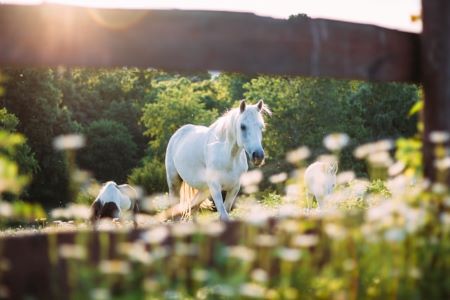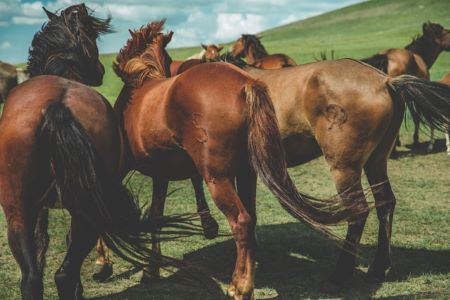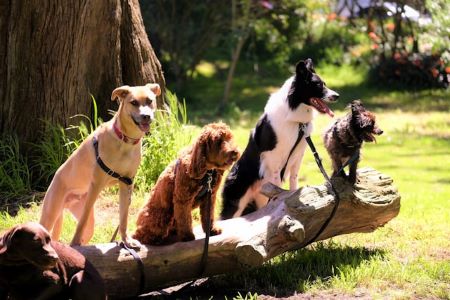Summer is here!
Did you dream of it through the cold winter months?
Did you long for the clear, warm days?
The long evenings with lots of time for hanging out with your horses?

And now its here, but it’s hot and humid, or dusty, we are sweating, and the animals are bugged by biting insects. Luckily, we have essential oils that can help us keep our cool and control the bugs aromatically so we can truly enjoy ourselves. But before I share my fragrant secrets with you, a few management tips to ensure your efforts are successful.
Summer Starts in Spring
I start summer with a good Liver cleanse in spring, so that the skin does not need to work hard clearing out toxins, making it more vulnerable to irritants. I offer essential oils of Carrot seed, or Juniper berry, Grapefruit, and Seaweed. And herbs such as milk thistle seed, (Silybum marianum) cleavers (Galium aparine), nettle (Urticaria diocia) and dandelion root or leaf (Taraxacum officinale).
I put these herbs in bowls for my animals to choose between every day for a week (or as long as they show interest). Each one will take according to his/her needs.
Salads in Summer
Next, a strong immune system gives increased ‘bug resistance’. If you notice one of your dogs or horses is more prone to bug attacks than others, it is a red flag that tells you to check out what is stressing him/her. Remove the stressor and offer essential oils or herbs to help re-balance. Make sure your horses have access to a good mineral mix as well, this is even more important in summer when they are sweating more. And be sure not over-exercise.
Summer’s heat makes it especially important not to feed heating foods such as molasses, grains or sugar beet. If your dog suffers from fungal infections it is even more important to cut out wheat, soy and all the other “fillers” you find in dry dog food. Add cooling food, such as cucumber, sprouts (including sprouted oats), orchard grass hay, alfalfa (in small amounts, low protein alfalfa is a very beneficial cooling food. My dogs often liked the horses’ soaked alfalfa nuts as well) and bitter herbs to help digestion. Dogs might also like kefir or yoghurt.
Natural Bug Control
If your animals are in good health, and their diet is species appropriate and well-balanced you may not need bug repellent at all. My dogs and cats never have fleas, despite living in a hot climate with lots of wildlife around (ticks are another story for a different day). My horses do get bothered by flies, but they have lots of natural ways to relieve themselves. They cluster together in the shade, head to tail, keeping flies off each other with their tails swishing. They go for total immersion in the lake. They roll in dirt. In fact all my animals like a good roll in the dirt when it’s hot, and I credit that with helping to keep them flea free and less itchy.
Imitating Nature
Not all animals have the freedom to find their own bug repellents. Luckily we can help them with that. We can let them get dirty, offer them aromatics in the form of essential oils or hydrosols, and if you live in the city and there is no clean dirt, you can dust them with Kaolin clay with 10% diatamaceous earth.
Many essential oils are bug repellent, but one of the characteristics of essential oils is that they are ‘volatile’, meaning they evaporate quickly. To give them more staying power you need to dilute them in a vegetable oil and use at least one fixative essential oil, such as patchouli (Pogostemon cablin ) or vetiver (Vetiveria zizanoides) to slow down evaporation. The carrier oil of choice is neem seed oil, one of the strongest (and smelliest) natural insects repellents we have. There is a recipe below.
Even when making a fly or flea spray, if you offer the oils so your animals can choose, you will get better results. Every creature has a unique chemical make-up which alters the effectiveness of any topical application. Apart from that, how much more pleasant it must be for your horse or dog to smell good to himself. You often find that horses who hate being sprayed will start to stand still and enjoy themselves when you custom make their fly spray.
Horses
The horse guardian’s main concern in the summer is how to control flying bugs, soothe itchy skin and keep cool. Because I look at life holistically and always search for the simple solution (laziness is an asset sometimes), I like to take care of all three things at once. I combine essential oils that cool, repel bugs and calm skin, add them to a bucket of water and slosh on liberally. My herd gather on the ‘forecourt’ in the afternoon waiting for their afternoon aromatherapy bath, then run down to the ‘sand pit’ (also known as an arena) to have a good roll, adding a good layer of dirt and sand to increase bug protection. The more you soak the coat with spray, the longer it will last.

Now, I must confess, I don’t ask each of the horses in my 9 horse herd every day exactly what they want. But I offer the blend to them every time I apply, and if they don’t like it (a couple of them don’t always like neem), I don’t apply it. The blend I use can last up to 3 days if really soaked in, (depending on the horse), so I do let them guide me, and don’t insist on everyday application. Same with the dogs, offer them the unopened bottle to smell and see which one they move toward and which one they avoid.
Dogs
Some dogs don’t like essential oils. If you find your dog runs away when you pull out the oil bottles, here are some ways you can protect your pup naturally without rubbing it in his fur
- A few drops of lemongrass hydrosol in a bowl of water for your dog to drink. This inhibits fleas and mosquitoes.
- You can add a few squirts of the above lotion to ¼ bucket of water as a coat conditioning/flea repelling wash. Wet your dog down first then sponge on from the bucket, as much as possible leave to air dry. This is also a good system in summer when it’s hot and you can leave them out in the garden to dry.
- Hydrosol spray, safer for daily applications if you feel it is needed, or around the face to protect from mosquitoes. Dilute hydrosol such as eucalyptus or lavender (or both) with distilled water 50/50.
- If you are going to a bug infested area and you really need to protect him, spray a kerchief with diluted bug repellent gel and tie around his neck. Remove when you return home.

Always be sure to use the minimum amount of essential oil possible. Apply the bug gel only when needed. Essential oils have a great potential to overwhelm a dog’s system and cause him to become allergic if you use them undiluted or too often. On the other hand if you allow your dog to guide you in how, when and which essential oils to use, you will keep your dog’s immune system in tip-top shape, ready to repel bugs and the diseases they often carry.
My Secret Recipe
This recipe makes you a 500ml/16oz of concentrate. For horses, add 1 cup to a bucket of water for ‘sloshing’, or dilute 1 part to 9 in a spray bottle. I like to splosh it all over my horses with a large sponge and rub it in well. This helps it to last longer.
For dogs, add a spoonful of the concentrate to 100 ml/1 cup of distilled water or hydrosol of your choice and rub or spray through coat.
When making up a spray, use distilled water or more hydrosols, add a teaspoon of cider vinegar, and shake well. You can adjust the ingredients to suit your horse or dog (see the list of essential oils options below), just keep the same ratio of vegetable oil, aloe gel, essential oil and hydrosol, but this is a blend that works well and smells good.
To make 500 ml/16 Fl oz of concentrate –
- 30 drops Geranium (Pelargonium graveolens) essential oil
- 20 drops Eucalyptus (Eucalyptus radiata) essential oil
- 5 drops Patchouli (Pogostomen cablin) essential oil
- 30 drops Cedarwood (Cedrus deodara or Atlantica) essential oil
- 100 ml/½ cup neem oil (Azadirachta Indica)
- 100ml/½ cup unscented, water based gel (aloe vera works well)
- 250-350 ml/8-12 fl oz Lemongrass (Cymbopogon citratus) hydrosol
Add the essential oils to the neem oil, mix into the aloe vera gel, and slowly stir in hydrosol to make up the amount. Shake well, store in a cool dark place, you can add a teaspoon of vitamin E oil to extend shelf life and help skin repair.
My Favourite Summer Essential Oils
There are many more essential oils that can help you get through summer’s heat with your cool intact, these are just the ones I tend to reach for first. Let your animals choose the ones they prefer, which may change every time you make a new blend! Play around with it, with your animal’s help, and see what great blends you can come up with for yourself.
Peppermint (Mentha piperita): just the smell is cooling, especially good for dry irritated summer coughs, also as a body coolant after work, there is nothing like peppermint hydrosol for heat stroke. Do not use on broken or sensitized skin.
Vetiver (Vetiveria zizanoides): cooling, grounding, used in India as roofing material to keep out insects and cool the room, smells a little like rain-spattered dirt. Fixative
Lemongrass Insect repellent, especially good against mosquitoes, cooling, (dilute well before using on sun-exposed skin)
Patchouli (Pogostomen cablin): Cooling, grounding, it is a strong fixative oil and really helps soothe itchy skin, and relieves Damp Heat
Geranium (Pelargonium graveolens): Moist and sweet, this is one of the most Yin supporting of essential oils, especially useful for hormonal Heat.
Ylang ylang (Cananga odorata): Sweet, soft, skin supportive, makes you feel at ease in your body
Spearmint (Mentha spicata): this is a softer, moister cool than peppermint, and has an anaesthetic effect, which can help calm irritated itching.
Cedarwood (Cedrus Atlantica): this is a great insect repellent, and a mild fixative, I nearly always include it in my bug repellents.
Lavender (Lavandula angustifolia): skin soothing, anti-irritant and bug repellent,

Summer is here, and with it comes the heat, humidity, and biting insects. Essential oils can help us and our animals stay cool and bug-free, but proper management is key. Start with a spring liver cleanse, boost the immune system, and provide natural bug control. Use essential oils like neem, cedarwood, and lavender, and allow your animals to choose their preferred scents. This holistic approach ensures a more enjoyable summer for both you and your furry companions.
For more about essential oils and holistic wellness for animals check out our courses, webinars and workshops
Main – Photo by Lucie Hošová on Unsplash





Leave a Comment